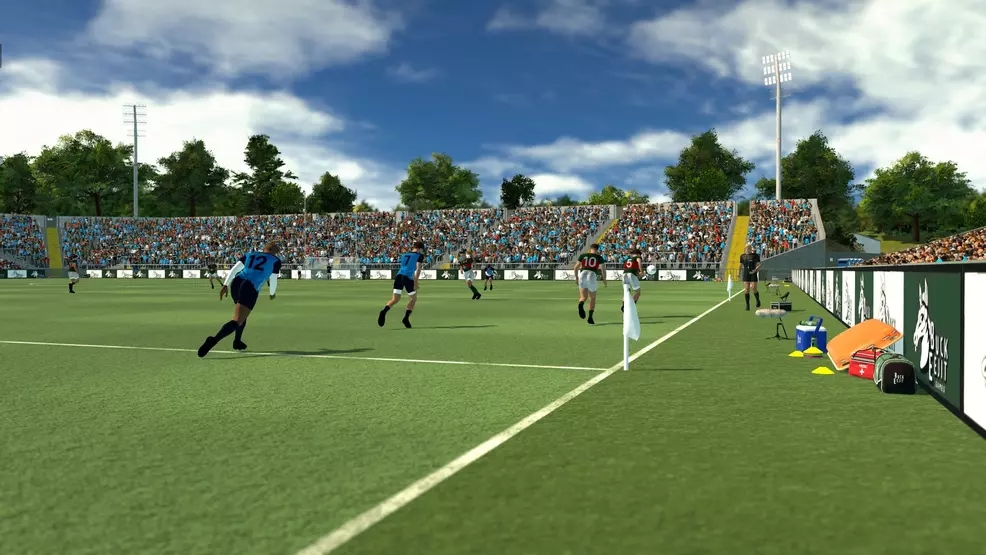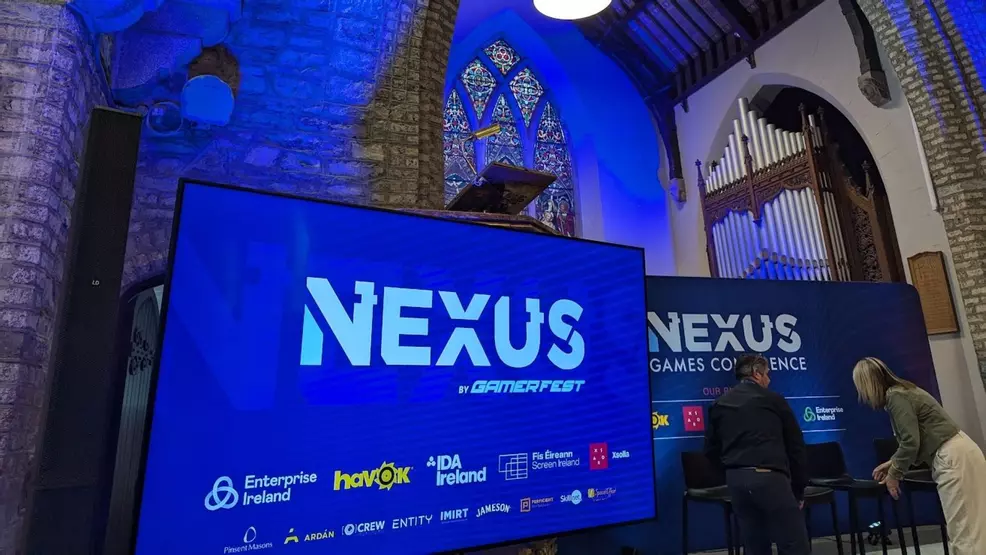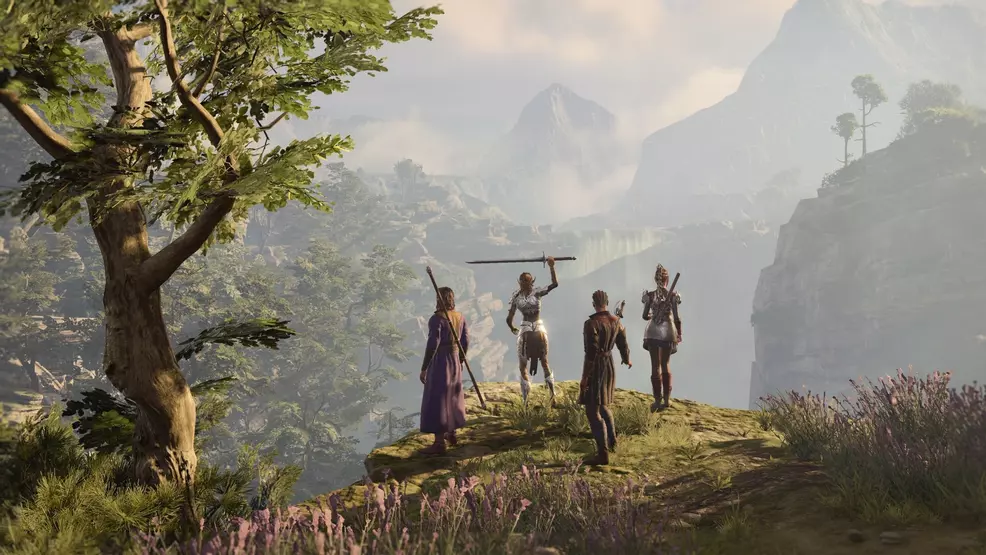Ireland should be a video game development hub. The country is already a tech hub for companies like Microsoft, Google, and Intel. It’s home to a steady stream of well-educated English-speaking graduates. It has a history of great storytellers, from Yeats, Wilde and Heaney to McDonagh, Rooney, and Blindboy. Irish developers like Sean Murray and Brendan Greene, who moved abroad, have found great success. It’s ideally located for travel and distribution to other parts of Europe and further afield. It’s politically as stable as any country can be in 2024, and people there love video games, with more than half the population actively gaming.
So why isn’t it? Having talked to many developers working in the industry in Ireland it seems there is one big glaring problem. Almost ten years after the Irish game’s scene was “poised to break out”, the rest of the world doesn’t seem to know the Emerald Isle is open for business.
If you have never attended Gamescom, it’s hard to overstate just how large a show it really is. Every year there are six to eight public halls crammed with games, tech, and publishers in the public area. In those areas, over 300,000 people will make their way through over the four days of the show. However, there is also a business area, and three more two-floor halls, dedicated to B2B (business-to-business) and press meetings.

Source: Gamescom
These halls are made up of publishers big and small, from Xbox to Devolver, service providers like AWS(Amazon Web Services), and even gaming chair suppliers, like Razor. However, roughly one hall is dedicated to country-specific delegations. Different countries’ governments, through their enterprise/foreign direct investment bodies or art councils, buy floor space in the business area so that developers working out of those countries can visit the show, and exhibit their games to the press and potential partners alike. Dozens of countries have booths, including France, Belgium, Greece, Sweden, Spain, Serbia and the UK. Even countries from further afield like Australia, Hong Kong, Singapore, Brazil, and the Philippines all have show floor space. The Republic of Ireland has never had a floor space.
Booth Space Bother
For years now, The Irish Game Makers Association, IMIRT, has funded delegations to attend shows like Gamescom, GDC (the Game Developers Conference) in San Francisco, and (before the pandemic) E3 in LA, with no show floor space for the creators to show their games. The result is that a common story you’ll hear from Irish developers is that they take meetings on the show floor, in nearby bars or restaurants or at another country’s booth.
Frustration around Irish dev’s lack of booth space came around retellings of the going-ons on at Gamescom 2023. According to several developers I spoke to an Irish developer ended up showing its Gaelic Football game at the British booth due to the lack of an Ireland stand at Gamescom - however, that’s not quite what happened. Buck Eejit is a developer made up of roughly a dozen people working on a Gaelic Football game. For those unfamiliar, Gaelic Football (along with Hurling) is one of two national sports of Ireland. These sports have a huge historical and cultural importance within Ireland, not least because they often became political symbols of Irish nationalism under British colonial control. While the island of Ireland is split into two distinct regions - one a sovereign republic in the south and one part of the United Kingdom in the North - both still play Hurling and Football and compete in the same competitions against each other.
Secondhand accounts claimed that Buck Eejit had nowhere to show its playable demo and, was offered a spot at The Association for UK Interactive Entertainment booth, the UK’s non-profit trade association for the video game industry often referred to as UKIE. This is only half true as Peadar McMahon of Buck Eejit clarified in an email. “We were indeed part of the UKIE stand, but this was because our studio is based in Belfast [in Northern Ireland]. We work closely with Northern Ireland Screen, which facilitates opportunities for the north specifically. Unfortunately, continuing to be under British colonial rules means we operate within a different jurisdiction from [developers] from the Republic of Ireland.”
McMahon continued, stating, “That said, we were glad to have an opportunity to showcase and we're proud to act as a de facto Irish stand at Gamescom, and we hope this helped to highlight the need for dedicated representation for Irish developers as a whole. We stand fully behind the ambitions of developers in the South to gain more government support and recognition. An Irish presence at events like Gamescom would be a huge step forward for the local industry.”

Source: Buck Eejit
Several developers I spoke to, who were aware a Gaelic Football game had been shown at the UKIE booth but were not aware of Buck Eejit’s location in Belfast described the incident as “embarrassing.” One senior developer at a Dublin-based studio explained, “They are obviously very nice and welcoming, and they’re our neighbors and everything like that, [but] we should have our own stand.” While an employee of IMIRT said, “Culturally that feels wrong.”
While Buck Eejit showing at the UKIE booth makes both practical and cultural sense, this incident does highlight Irish game developers' general frustration with a lack of a collective front. It also shows how the lack of support for centralised organisations like IMIRT can lead to rumours circulating around the industry.
The Republic of Ireland has several high-profile developers within its boards. Dublin alone is home to over 60 Larian employees, flying high off the back of Baldur’s Gate 3’s success; Black Shamrock, which has worked on games like Marvel’s Midnight Suns, The Outer Worlds, Grounded, Back 4 Blood and more; and Scopely, developers of massively popular Monopoly Go!, acquired the Dublin-based DIGIT interactive in 2019. On top of this, the country has fostered a small, but notable indie scene with developers like Dreamfeel, Spooky Doorway, and Enigma Studio all located in the Republic of Ireland. This is without mentioning that famed game designers John and Brenda Romero have made Galway City the home of their studio, Romero Games.
As such, in recent years, there has been a push for internal biz-dev events and networking opportunities. Until recently, it has not been uncommon to see Irish developers more often at a pub in Cologne during Gamescom, than at any official events held within the country.
Nexus Point
Events like the FÍS Games Summit have run out of Galway for several years now - and focus on supporting homegrown and independent ventures through the support of IMIRT and the Irish film board Screen Ireland. NEXUS, on the other hand, takes place in the country’s capital and has just entered its second year as it seeks to highlight wider conversations about the Irish games industry. In 2024, this meant hosting panels that focused on Ireland's place on the world stage, including one called “Play And Progress: The Growth of Ireland’s Gaming Ecosystem.”
This panel, hosted by IMIRT CEO and Game Director at Gambrinous, Colm Larkin, included representation from Justin O’Connor, The Head of Finance from StoryToys a Dublin-based child-friendly app developer; Chris Vossen, The Head of Narrative at Larian; and Donal Travers, the Head of Technology, Consumer, and Business Service at Ireland’s Foreign Direct Investment Agency, the IDA. This conversation - that featured panelists from an Irish-owned company, a company that set up an office due to the county’s attractive corporation tax and market position, and a representative of the wider Irish government - gave great insight into one of the main points of tension between Irish game developers and the current Irish government: Lack of understanding.

Source: Lex Luddy
During this panel, Ireland’s lackluster presence at foreign trade shows came up several times. When quizzed as to why Ireland has never had a booth at Gamescom or GDC, Travers diplomatically told the attendees that buying show floor space is a large investment and something the IDA and Enterprise Ireland seemingly have deemed not worthwhile. The other three panelists seemed unconvinced by this explanation, putting forward that it can’t be looked at as an expenditure when the opportunity cost of not having show floor space seems so evident. O’Connor of StoryToys also asked Travers how the government could not afford to fund a booth at shows like these but could afford a €300,000 bike shed outside of The Dáil.
Credit Where Credit’s Due
Following on from this, the panel took to discussing one of the few positive implementations the Irish government has put forward to encourage game development in Ireland. In 2022, the government enacted a Digital Gaming Tax Credit, which offers a refundable tax credit on up to 32% of expenditures relating to a digital game. At the time, this credit was welcomed as a huge stepping stone to making Ireland a competitive game development environment. However, in the two years that have passed, many have found its restrictions archaic and worry that the government will be too slow to update the policy.
Prior to the 2024 national budget, IMIRT were lobbying the government to update the Digital Game Tax Credit (DGTC) when it came to two glaring issues for modern game development.
As it stands, the credit can only be availed of by works which are wholly developed in Ireland. This means that third-party contractors, such as work-for-hire support or co-development studios like Black Shamrock, could not claim the credit. Also, games that featured development from across multiple international teams (like Baldur’s Gate 3) could not make use of the credit either. In its proposal to the government, IMIRT outlines that “Games are often monumental projects with work divided among several locations. Allowing contributions from Irish Studios to qualify will encourage international studios to establish satellite operations in Ireland, supporting domestic talent and attracting foreign direct investment.”
A second point of contention comes down to when the tax credit can be claimed According to the scheme, once a game’s expenditure passes €100,000 a developer can apply for credit “on Completion”. These two words have caused a fair amount of acrimony as “On Completion” is defined as when a game “has been released to the public” or when “the game is provided to a third-party commissioner/publisher.” Furthermore, it is noted that further costs retailed to post completion content are not covered, this includes, “patching or development of additional downloadable content.” For many, this is a huge source of frustration. While the credit can be claimed each through production, the phrasing around game “completion” has many devs worried about the Irish government's awareness of the state of the industry. As it stands, live service games, which see continued support, will not be able to avail of the tax post-release.
Larian has stated that it didn’t try to claim this tax credit for Baldur’s Gate 3 as the game was already well into development before 2022. However, this wording would mean that even if the studio did, it would not be able to avail of the credit following the game’s 2023 release for the game’s extensive post-launch content. Furthermore, depending on the government’s interpretation, the credit might have even ended when it first entered early access in 2020, because at that point, it was technically “released to the public” on Steam.

Source: Larian
As it stands, only a mere 16 companies have claimed the tax credit. CEO of IMIRT Colm Larkin thinks a lot of that comes down to visibility. He says that while the tax credit is a great “tentpole… we can build around”, he explains, “You’ve got a tax break and you’re not advertising it.” By not receiving wider government backing it has resulted in international partners not being aware of potential benefits of setting up shop in Ireland. His suggestion is, once again, to reinvest in the space, whether it be buying booth space at Gamescom or supporting independent development beyond the €15,000 indie game grant announced at FÍS Game summit last year.
“Our games, quietly, have been hits on the global stage,” said Larkin, “I don’t think people in general recognize them… but we’re not doing really well at talking about [our successes].”
All of this is paired with the fact that compared to Screen Ireland's Tax Credit for Irish-based films and television, the Digital Games Tax Credit is simply less useful. In short, Irish films can apply for the tax credit before production begins based on estimated budgets. The government will then provide 90% of the credit upfront, acting as an extra influx in cash during early production. The Digital Game credit does not operate in this way. It instead allows developers to apply for relief once they get a temporary certificate for the credit, which takes at least six months to process and can only be initiated once development has begun. This is a big problem for game development, especially for studios that haven't released previous games. While the film credit gives filmmakers an upfront allotment of cash that they can use to start production and shop projects around for further funding, the games credit means that devs need a solid six months of overhead before they can avail of the much more limited support. With game development often requiring huge investments upfront for hardware and tools, many feel like the tax credit doesn't support developers when they need it most.
As of the last national budget on the 10th of October, 2024, the Digital Game Tax Credit was not amended. Now after the recent General Election on 29th of November resulting in a turnover of government members (and likely a new Minster for Enterprise, Trade and Employment and a new Minister for Tourism, Culture, Arts, Gaeltacht, Sport and Media come the new year) and many devs worry that the headway made with the previous government will be lost and momentum in addressing their concerns will fade.
Bleed Green
While many in the Irish game development scene members feel frustrated by the state of support for Irish game development, it is worth noting that there are still countless cool projects being worked on in Ireland. Enigma Studio recently completed its “Trilogy of five games” to critical acclaim, Larian has continued to hire and expand as it moves on to its next project, Romero Games is currently hiring for a new first-person shooter, Dreamfeel continues to work on multiple games after its award-winning If Found…, and studios like Gambrinous, Spooky Doorway and Tall Team all continue to successfully operate during unprecedentedly tough times for the market.
Living in Ireland and having interviewed roughly a dozen people, there is a sense of excitement and comradery in the Irish game scene that feels special. Groups like Ardán have helped “[developers] move from our bedrooms out into the wider industry”, as Enigma Studio owner Jamie Gavin puts it. Meanwhile, initiatives like Run For The Border encourage developers in the Republic of Ireland to collaborate with Northern Irish developers to avail of the UK’s game development support.
![Screenshots of games developed in Ireland including: Cardpocalypse (Gambrinous, If Found... (Dreamfeel), The Darkside Detective (Spooky Doorway) and [Echostasis] (Engima Studio) Screenshots of games developed in Ireland including: Cardpocalypse (Gambrinous, If Found... (Dreamfeel), The Darkside Detective (Spooky Doorway) and [Echostasis] (Engima Studio)](https://d1lss44hh2trtw.cloudfront.net/resize?type=webp&url=https%3A%2F%2Fshacknews-www.s3.amazonaws.com%2Fassets%2Feditorial%2F2024%2F12%2Firish-games-industry-5.jpg&width=986&sign=CZEqF12PAWID0vtWzZy9urv8uHfjoSxSBahTEZqJmFg)
Source: Lex Luddy
Furthermore, while several developers currently feel frustrated with the level of support the Irish government and agencies like the IDA give them, there is a sense that they have caught the ear and attention of these groups. Elaine Reynolds, General Manager at Black Shamrock, explained that developers feel like they are being taken seriously when looking for government backing. She said, “The fact that the IDA are [at Nexus 2024], that they’re sponsoring this event, [that they’ve] visited our office, [and] were willing to put someone on stage [to answer developers’ questions]... I think there’s a lot of support there.”
Denman Rooke, an artist who has worked for Romero Games, DIGIT, and has done work for Wizards of The Coast at Studio Rucach put it well when he told me, “The state of game development in Ireland has been growing slowly over the last 10 years. But it definitely seems to have picked up pace, especially in the last 5 years with larger studios' successes like DIGIT, Black Shamrock, and Romero Games… There's a lot of creative talent here, but there definitely is a lack of support for smaller indigenous companies to get started. That being said, I'm very optimistic about the state of the industry and its growth, but there's a lot of work we need to do.”
As of publishing the IDA did not provide an official response to this piece citing key staff being unable to provide comment due to travel.
-
Lexi Luddy posted a new article, Ireland is primed to be a video game development hub, but after years of lobbying, the country's gov


